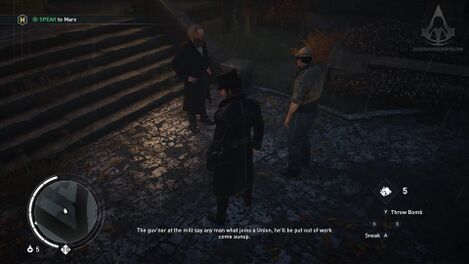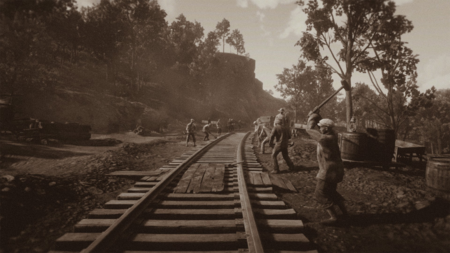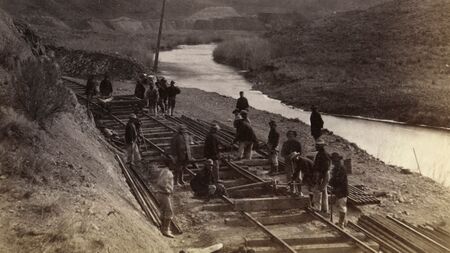User:Berna Bereit Master Thesis Outline: Difference between revisions
Berna Bereit (talk | contribs) No edit summary |
Berna Bereit (talk | contribs) No edit summary |
||
| (7 intermediate revisions by the same user not shown) | |||
| Line 1: | Line 1: | ||
== 1 Intro == | == <span style="font-family: Poppins; "> 1 Intro == | ||
''»Videogames are perhaps the most significant development in the modern popular arts, and they provide a fertile field of study for philosophers of the arts (and philosophers more generally).« (Robson, Grant (Eds.), 2018)'' | ''»Videogames are perhaps the most significant development in the modern popular arts, and they provide a fertile field of study for philosophers of the arts (and philosophers more generally).« (Robson, Grant (Eds.), 2018)'' | ||
Video games are a growing medium that is increasingly used as a platform for social and political discourse. The representation of labour and trade unions in games not only reflects historical and contemporary conflicts, but also provides a framework to address system criticism, solidarity and collective action. | Video games are a growing medium that is increasingly used as a platform for social and political discourse. The representation of labour and trade unions in games not only reflects historical and contemporary conflicts, but also provides a framework to address system criticism, solidarity and collective action. | ||
| Line 12: | Line 12: | ||
''»There is a lot of history in the game industry as rooted in nerds in garages and doing it for the love of it. That has just filtered down into places expecting employees to just go above and beyond without question, all the time.» (Cote, Harris, 2021)'' | ''»There is a lot of history in the game industry as rooted in nerds in garages and doing it for the love of it. That has just filtered down into places expecting employees to just go above and beyond without question, all the time.» (Cote, Harris, 2021)'' | ||
[[File:Karl-marx-storyline-4.jpg|left|thumb|469x469px|Screenshot. Assassin's Creed: Syndicate (2015)]] | [[File:Karl-marx-storyline-4.jpg|left|thumb|469x469px|Screenshot. Assassin's Creed: Syndicate (2015)]] | ||
[[File:Zenimax-strike-13-11-24-austin-texas-twitter.png|none|thumb| | [[File:Zenimax-strike-13-11-24-austin-texas-twitter.png|none|thumb|405x405px|ZeniMax employees strike on 13/11/24 in Austin, TX. (Twitter @ZeniMaxWorkers)]] | ||
== 2 Chapters == | How does the visual and narrative design of games affect the perception of social realities and to what extent can these representations stimulate reflection on labour, trade unions and historical events? Who has the agency for the visual and narrative concepts? What happens when the lines between real and realistic blurr? | ||
== <span style="font-family: Poppins; "> 2 Chapters == | |||
The thesis is divided into four main chapters, which focus on theoretical research, game analysis and current game developments. | The thesis is divided into four main chapters, which focus on theoretical research, game analysis and current game developments. | ||
The theoretical research analyses the academic literature on trade unions in the fields of social theory, cultural studies and game studies. Analysing the history of trade unions and labour movements in art, film and literature as a context for representation in video games. | The theoretical research analyses the academic literature on trade unions in the fields of social theory, cultural studies and game studies. Analysing the history of trade unions and labour movements in art, film and literature as a context for representation in video games. | ||
Explicit insights into the representation can be gained from a selection of relevant games that deal with trade unions and labour disputes. The investigation of the narrative and mechanical implementation of trade union themes in these games as well as the analysis of the visual aesthetics and design of these games in relation to the labour movement are part of the second part of the thesis. The qualitative focus will be on a selection of games that provide exemplary insights into different narratives and game spaces. | Explicit insights into the representation can be gained from a selection of relevant games that deal with trade unions and labour disputes. The investigation of the narrative and mechanical implementation of trade union themes in these games as well as the analysis of the visual aesthetics and design of these games in relation to the labour movement are part of the second part of the thesis. The qualitative focus will be on a selection of games that provide exemplary insights into different narratives and game spaces, discussing how games as a medium reflect social realities and which narrative and aesthetic decisions lead to a critical examination of labour disputes. | ||
[[File:Central-union-railroad-camp-03.png|left|thumb|450x450px|Screenshot, Red Dead Redemption 2, Central Union Railroad Camp, photo mode filter used]] | |||
[[File:Hart curving iron 5818.jpg|center|thumb|450x450px|Workers lay track along the Ten Mile Canyon stretch of the Transcontinental Railroad. Image credit: Alfred A. Hart Photographs, 1862-1869, Department of Special Collections, Stanford University Libraries]] | |||
In the third part, parallels will be drawn with the games industry and current trade union movements, for example at Microsoft. The question of agency will be proposed, asking who writes the stories and makes the primary choices? Who is joining the trade unions and what are the prospects of it? | In the third part, parallels will be drawn with the games industry and current trade union movements, for example at Microsoft. The question of agency will be proposed, asking who writes the stories and makes the primary choices? Who is joining the trade unions and what are the prospects of it? | ||
== <span style="font-family: Poppins; "> 3 Method == | |||
== 3 Method == | |||
A literary Research will give the theoretical background, giving an overview of current discussions about games and labour (unions). The analysis of the games will be the practical part where a selection of video game sequences are examined based on their visual, narrative and ludic elements. Displayed as side stories to the main plot or sometimes just by actively interacting with or through observing non-player characters (NPCs), the photography mode of the game helps to examine specific scenes and spaces. | A literary Research will give the theoretical background, giving an overview of current discussions about games and labour (unions). The analysis of the games will be the practical part where a selection of video game sequences are examined based on their visual, narrative and ludic elements. Displayed as side stories to the main plot or sometimes just by actively interacting with or through observing non-player characters (NPCs), the photography mode of the game helps to examine specific scenes and spaces. | ||
== 4 Mode of address == | == <span style="font-family: Poppins; "> 4 Mode of address == | ||
Directed towards players and game enthusiasts, the project adds a perspective besides consuming and playing games, proposing a reality to those apparently fictional game worlds. Likewise, I am aiming to practise my theoretical writing within the thesis — and the extended book(let) version — to keep the possibility open for a PhD afterwards. Therefore, a second audience will be artists and designers in research. | Directed towards players and game enthusiasts, the project adds a perspective besides consuming and playing games, proposing a reality to those apparently fictional game worlds. Likewise, I am aiming to practise my theoretical writing within the thesis — and the extended book(let) version — to keep the possibility open for a PhD afterwards. Therefore, a second audience will be artists and designers in research. | ||
== 5 References == | == <span style="font-family: Poppins; "> 5 References == | ||
Aarseth, E., Günzel, S. (Eds.), 2019. Ludotopia: Spaces, Places and Territories in Computer Games. 1st ed, Edition Medienwissenschaft. transcript | Aarseth, E., Günzel, S. (Eds.), 2019. Ludotopia: Spaces, Places and Territories in Computer Games. 1st ed, Edition Medienwissenschaft. transcript | ||
Latest revision as of 13:34, 21 November 2024
1 Intro
»Videogames are perhaps the most significant development in the modern popular arts, and they provide a fertile field of study for philosophers of the arts (and philosophers more generally).« (Robson, Grant (Eds.), 2018)
Video games are a growing medium that is increasingly used as a platform for social and political discourse. The representation of labour and trade unions in games not only reflects historical and contemporary conflicts, but also provides a framework to address system criticism, solidarity and collective action.
Since Role-playing Games (RPG) are becoming more realistic, trying to imitate reality not only by its graphics but also by its in-game narratives and (historical) game spaces, the game is becoming an immersive experience, blurring the boundaries of reality and fiction.
No matter if you’re riding as Arthur Morgan and the infamous Van der Linde gang across America at the dawn of the modern age in Red Dead Redemption 2, rescuing the mysterious imprisoned girl Elizabeth as the U.S. Cavalry veteran Booker DeWitt in Bioshock Infinite or defeat revival gangs to bring freedom to the oppressed masses during The Industrial Revolution in London 1868 as Jacob Frye in Assassin’s Creed Syndicate, players are travelling from the physical reality into the virtual universe of the game through the screen.
The thesis deals with the analysis of the representation of trade unions and labour movements in video games. This includes the examination of narrative threads, game mechanics and aesthetic elements that focus on labour struggles and collective organisations in games such as Red Dead Redemption 2 and Bioshock Infinite. It also addresses the issue of trade unionism in the game industry itself, particularly in relation to the working conditions of developers.
While non-player characters (NPC) are programmed with little autonomy working in endless loops to support the realism of the gamespace, artists, engineers, programmers and designers face periods of unpaid overtime to speed up lagging video game productions — called “Crunch”. The real and realistic crunch of NPC and video game developers can be observed as separate topics, yet similarities appear between those two — artists, engineers, programmers and designers crunching to finish games that tell stories of exploited workers.
»There is a lot of history in the game industry as rooted in nerds in garages and doing it for the love of it. That has just filtered down into places expecting employees to just go above and beyond without question, all the time.» (Cote, Harris, 2021)
How does the visual and narrative design of games affect the perception of social realities and to what extent can these representations stimulate reflection on labour, trade unions and historical events? Who has the agency for the visual and narrative concepts? What happens when the lines between real and realistic blurr?
2 Chapters
The thesis is divided into four main chapters, which focus on theoretical research, game analysis and current game developments.
The theoretical research analyses the academic literature on trade unions in the fields of social theory, cultural studies and game studies. Analysing the history of trade unions and labour movements in art, film and literature as a context for representation in video games.
Explicit insights into the representation can be gained from a selection of relevant games that deal with trade unions and labour disputes. The investigation of the narrative and mechanical implementation of trade union themes in these games as well as the analysis of the visual aesthetics and design of these games in relation to the labour movement are part of the second part of the thesis. The qualitative focus will be on a selection of games that provide exemplary insights into different narratives and game spaces, discussing how games as a medium reflect social realities and which narrative and aesthetic decisions lead to a critical examination of labour disputes.
In the third part, parallels will be drawn with the games industry and current trade union movements, for example at Microsoft. The question of agency will be proposed, asking who writes the stories and makes the primary choices? Who is joining the trade unions and what are the prospects of it?
3 Method
A literary Research will give the theoretical background, giving an overview of current discussions about games and labour (unions). The analysis of the games will be the practical part where a selection of video game sequences are examined based on their visual, narrative and ludic elements. Displayed as side stories to the main plot or sometimes just by actively interacting with or through observing non-player characters (NPCs), the photography mode of the game helps to examine specific scenes and spaces.
4 Mode of address
Directed towards players and game enthusiasts, the project adds a perspective besides consuming and playing games, proposing a reality to those apparently fictional game worlds. Likewise, I am aiming to practise my theoretical writing within the thesis — and the extended book(let) version — to keep the possibility open for a PhD afterwards. Therefore, a second audience will be artists and designers in research.
5 References
Aarseth, E., Günzel, S. (Eds.), 2019. Ludotopia: Spaces, Places and Territories in Computer Games. 1st ed, Edition Medienwissenschaft. transcript
Verlag, Bielefeld, Germany. https://doi.org/10.14361/9783839447307
AshwinY (2023). What Happens If Arthur Tries To Help The Poor Miners In Annesburg? - RDR2. [online] YouTube. Available at: https://www.youtube.com/watch?v=82INAQY0rEU [Accessed 22 Oct. 2024].
AshwinY (2023). What Happens If Arthur Tries To Help The Poor Miners In Annesburg? - RDR2. [online] YouTube. Available at: https://www.youtube.com/watch?v=82INAQY0rEU [Accessed 22 Oct. 2024].
Bashady, Hamza. 2022. A Passive Mob: How Video Games Silence Dissent. Online. URL: https://futuress.org/stories/a-passive-mob]
Cote, A.C.,
Harris, B.C., 2021. ‘Weekends became something other people did’: Understanding and intervening in the habitus of video game crunch. Convergence: The International Journal of Research into New Media Technologies 27, 161–176. https://doi.org/10.1177/1354856520913865
Cote, A.C., Harris, B.C., 2021. ‘Weekends became something other people did’: Understanding and intervening in the habitus of video game crunch. Convergence: The International Journal of Research into New Media Technologies 27, 161–176. https://doi.org/10.1177/1354856520913865
Kerr, C. (2024a). Bethesda Game Studios workers form ‘wall-to-wall union’ at Microsoft. [online] Gamedeveloper.com. Available at: https://www.gamedeveloper.com/production/bethesda-game-studios-form-wall-to-wall-union-at-microsoft [Accessed 2 Nov. 2024].
Kerr, C. (2024b). UK union
IWGB Game Workers launches manifesto after topping 1,500 members. [online] Gamedeveloper.com. Available at: https://www.gamedeveloper.com/production/uk-union-iwgb-game-workers-launches-manifesto-after-topping-1-500-members [Accessed 2 Nov. 2024].
Kerr, C. (2024b). UK union IWGB Game Workers launches manifesto after topping 1,500 members. [online] Gamedeveloper.com. Available at: https://www.gamedeveloper.com/production/uk-union-iwgb-game-workers-launches-manifesto-after-topping-1-500-members [Accessed 2 Nov. 2024].
Nieuwdorp, E., 2005. The Pervasive Interface: Tracing the Magic Circle.
NiZZULiVΞ (2013). BioShock Infinite Job Auction Bidding Citizens Town Square Plaza of Zeal Finkton. [online] YouTube. Available at: https://www.youtube.com/watch?v=4AVihhOrVUI [Accessed 1 Nov. 2024].
Robson, J., Grant, T. (Eds.), 2018. The Aesthetics of Videogames. 1. Edition. ed. Routledge, New York.
Schubert, S., 2018. Dystopia in the Skies: Negotiating Justice and Morality on Screen in the Video Game BioShock Infinite. ejas. https://doi.org/10.4000/ejas.14089
Total Refusal, 2022. Hardly Working. [online]. Available at: https://totalrefusal.com/home/hardly-working
to, C. (2016). Red Dead Redemption 2 Cut Content. [online] Red Dead Wiki. Available at: https://reddead.fandom.com/wiki/Red_Dead_Redemption_2_Cut_Content [Accessed 21 Oct. 2024].
to, C. (2024). Twenty Miners Killed. [online] Red Dead Wiki. Available at: https://reddead.fandom.com/wiki/Twenty_Miners_Killed [Accessed 21 Oct. 2024].
Woodcock, Jamie, 2019. Marx at the Arcade - Consoles, Controllers, and Class Struggles. Haymarket Books, Chicago.




